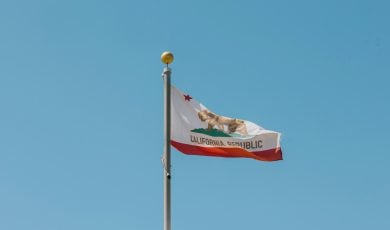Even outside of the seasonal surge in sports betting volume, October was a busy month for gambling news.
The Global Gaming Expo (G2E) returned to Las Vegas, for starters, with attendance for the annual trade show returning to pre-pandemic levels of around 25,000 visitors. G2E represents the biggest opportunity for game developers and equipment manufacturers to demo their new products – everything from new crazy craps layouts to comfier chairs – and there were plenty of things that caught our eye this year.
You can read Marc Meltzer’s dispatch from the expo floor here.
Of course, it’s hard to ignore sports betting this time of year. Football season is in full swing, and hockey and basketball have put us into the meaty part of the calendar for both sports and gambling. Betting volume has awoken from its summer slumber but, as we’ll explain later, recent reports seem to indicate that most markets have leveled off from their 2021 growth spurt.
Much of the future growth potential for US sports betting rests within the country’s three biggest states, none of which are close to legalization. We’ll cover the complications in California and Florida later in this rundown, but Texas remains another big prize for the industry that seems to be just out of reach and completely out of the conversation for the time being.
That’s not to say the future isn’t bright. The recent slowdown for isolated markets in some cases speaks to expansion in neighboring markets, and in all cases speaks to a general maturation of the industry across the map. It’s also a retrospective indication of just how much of the post-pandemic handle has been inflated by unsustainable promotional spending.
November gambling news headlines
By the time we write next month’s report, folks in Maryland could be betting online. Maybe.
Regulators in the Old Line State have certainly taken their time with expansion, but they’ve finally announced a launch window that opens in just three short weeks. Online sports betting could begin as soon as November 21 or as late as December 5, and the state’s history suggests the latter is more plausible.
Our forecast for omnichannel sports betting in Maryland reaches $4.4 billion in handle and $350 million in revenue in 2023, more than a tenfold increase over 2022’s pace. Check out PlayMaryland for the latest updates, including recent stories on licensure and launch timelines.
Folks in Massachusetts, on the other hand, will definitely not be betting on sports by Thanksgiving. Nor by Christmas. There’s still no real schedule for launch at all, in fact, but regulators have at least begun to cite some tentative timelines.
January 2023 is the earliest we could see any regulated sports betting in Massachusetts, likely in the brick-and-mortar setting to start. Online betting could follow in time for the Super Bowl in February. Maybe. Or the process could drag on well into the spring. It’s anybody’s guess at this point.
The lack of a timeline makes it difficult to forecast Massachusetts’ financial prospects for 2023, but it’s definitely capable of competing for a top-10 spot among US markets in its first full year of operation.
Ohio is meanwhile still on track for a January 1 launch despite the state’s top regulator accusing some applicants of acting like petulant children.
Everyone is just a little too eager to get going, according to OCCC Executive Director Matt Schuler, complaining that his office is being barraged by calls from applicants inquiring about their position in the queue. It sounds like most of his ire is directed at smaller local applicants who simply aren’t familiar with the process of being vetted for a gambling license.
Ohio is also a party to one of the month’s least-surprising industry headlines.
Streaming giant Fubo TV shuttered its underachieving sports betting segment with immediate effect, pulling out of three states and vacating its slot in Ohio as the online partner for the Cleveland Cavaliers. The Cavs are now likely to watch the synchronized digital launch from the bench as they search for a replacement partner. They are, however, moving forward with their plans to open a Caesars-branded sportsbook at Rocket Fieldhouse this season.
Financial report: September 2022
The American Gaming Association recently put out a report suggesting that US sports betting operators are on pace to surpass $100 billion in handle for the 2022 calendar year. Reaching that mark would require a truly impressive September and a fourth quarter on par with Q4 2021, which seems reasonable enough on the surface.
In practice, though, that push to nine figures doesn’t seem to be materializing.
Of the 19 markets that have data for both September 2021 and September 2022, eight endured a year-over-year decrease in volume. That includes some of the heaviest hitters too, with New Jersey, Nevada, and Michigan all showing some apparent pullback. The first signs of slowdown began to appear as the spring sports season faded into the slower summer, but a failure to return to 2021 levels this September hints that $100 billion is out of reach this year.
The good news for operators is that revenue was way up in September. Only three of the smallest markets saw a year-over-year revenue decline, whereas most markets were substantially up from 2021. The timing and method of reporting make it difficult to pinpoint the exact reasons for this, but it’s likely a combination of (1) a particularly bad month for NFL bettors, (2) a massive increase in parlay betting, and (3) the accumulation of fresh futures bets from all four major US sports. Points #1 and #2 are correlated.
Here’s what September 2022 looks like with the data available so far:

Our target for the calendar year currently sits at $97.2 billion in handle, which would still represent a handy 68% increase over 2021’s total. Combined revenue should approach $7.5 billion across all markets, generating more than $1.5 billion in taxes for state and local governments.
You can see a complete timeline of the sports betting financials for all US markets at playusa.com/revenue.
What we’re waiting for
Ontario iGaming revenue
IGaming Ontario published its results for online casino gambling and sports betting for fiscal Q2, which is really calendar Q3 after the conversion rate (July-September). They weren’t great.
Regulated operators combined to generate CAD $267 million in revenue for the quarter, which converts to about USD $196 million. That’s a 65% increase from the previous quarter — which was the first quarter of regulated operations — but it still lags pretty far behind most (admittedly more mature) US jurisdictions. Operators in Michigan, for example, churned out close to $500 million in Q3 revenue from a population that’s about two-thirds the size of Ontario’s.
You can find a more-detailed breakdown of the Q3 report from PlayCanada here.
What we’re really waiting for is numbers from Ontario Lottery & Gaming, which has not yet reported its portion of the proceeds. OLG is likely responsible for more revenue than we’d expect from a US market with a comparable structure, and there does seem to be plenty of room for continued growth in Ontario based on the performance so far. So that’s a silver lining in an otherwise modest report.
The October addition of Pinnacle, one of the world’s elite bookmakers, to the roster of regulated sportsbooks in Ontario should help bolster the numbers for Q4.
California sports betting showdown: Part II
As we march into the midterm elections, it looks increasingly likely that the contentious efforts to legalize sports betting in California will fall short this year. The CEOs of both DraftKings and FanDuel seemed to wave the white flag during appearances at G2E, conceding that the tribal opposition is simply too strong to overcome at the ballot box this month.
“If an opposition side is going to spend over $100 million, it’s just tough to beat,” DraftKings CEO Jason Robins said. “It doesn’t matter what your issue is, it’s tough to beat. And going and trying to outspend that actually probably makes it worse because then people just get sick of seeing all the ads all the time.”
The coalition of operators pushing for passage spent roughly twice as much money as that opposition in what now looks like a failed attempt to open up the nation’s largest market. According to the chairman of the Pechanga, lobbying for any model that undercuts tribal sovereignty is a waste of money.
“Tribes need to be the ones to decide what the framework for legalization looks like,” Mark Macarro said. “I suppose there can be others in the car, but if the tribes aren’t in the driver’s seat, we’re going to be taken for a ride.”
A competing proposal that would have allowed tribes to offer retail-only sports betting also appears poised to fall well short of passage.
Failure won’t stop people in California from betting on sports, and it certainly won’t stop the efforts to legalize and regulate it going forward — particularly from the large national operators that have “invested” hundreds of millions of dollars into the effort already. Look for the issue to remain a persistent topic of conversation throughout the upcoming legislative session and all the way into the next election season.
“We absolutely live to fight another day,” FanDuel CEO Amy Howe said. “Whether we get there in 2022, or, hopefully, we get there in 2024, we believe it is the right path.”
Florida sports betting resolution
Tribal sovereignty sits at the root of another big sports betting confrontation in another massive state: Florida.
Litigation surrounding the compact between the state and the Seminole Tribe is starting to come into focus as the two sides clarified their arguments in another round of briefs filed this past month. The battle centers around the proposed provisions for statewide online betting within the compact, which a court invalidated late last year. Opponents of the compact argue that the federal law which governs such compacts does not create any allowance for such an implementation.
It’s honestly too complicated to explain in more detail in this space, but John Holden has written extensively on the topic for Legal Sports Report. Read more about the latest filings here:
ESPN Sportsbook?
Everyone’s favorite industry thought experiment resurfaced once again early last month with Bloomberg initially reporting that ESPN and DraftKings are forming an exclusive sports betting partnership. It’s not the first time we’ve heard rumors like this involving ESPN, there are no details about this alleged alliance, and neither party is saying a word. But we have fresh rumors!
It does seem like Disney is slowly starting to warm to the idea of activating its ESPN brand within the sports betting space after years of lukewarm resistance. CEO Bob Chapek recently told reporters that the company was “working very hard” on sports betting, and he seemed favorable to the idea of forging an operational partnership with a large national bookmaker. DraftKings would certainly fit that bill.
Whether or not this leads to an ESPN Sportsbook product, or whether it even materializes as reported, remains unclear.








